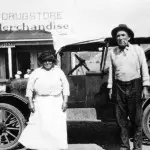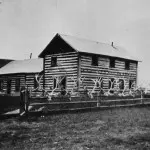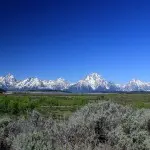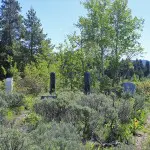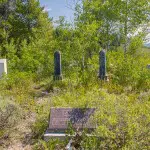Charles and Maria Allen, Frank Lovell, and Cap and Clara Smith were the first homesteaders in the area is now known as Moran. The three families arrived between 1895 and 1900. Reports show that the Smiths operated a roadhouse that burned in 1900. Shortly after the fire they sold their homestead along with neighbor Frank Lovell to Benjamin Sheffield. The Allens homesteaded nearby and built the Elk Horn Hotel in 1897, which catered to traffic using the military road going to Yellowstone. They found enough business to operate the Elk Horn, despite the nearby larger Teton Lodge, built by Sheffield in 1903. The Deloneys, who owned a mercantile store in the town of Jackson at the southern end of the valley, opened a small general store in the bottom floor of the Elk Horn. This tiny mercantile was the sole supplier of goods in the northern end of the valley during the early years.
In 1902, Maria Allen received permission to open the post office on their ranch. She named the post office Moran after the mountain that dominated the landscape. From this point on, Moran became the name of the small town that would soon be populated with visitors from Sheffield’s lodge and the Reclamation Service camp. The Elk Horn Hotel was one of the first road-side hotels in the valley, also known as roadhouses. They catered to overnight travelers coming from the south entrance of Yellowstone via the military road that was built between 1890 and 1892. The majority of Yellowstone’s visitors accessed the park through the north and west entrances, but enough visitors used the south entrance to justify the $15,000.00 approved by Congress to construct a road from the Upper Geyser Basin (Old Faithful) to Yellowstone’s south entrance. With the advent of the military road, it was also much easier for tourist traffic to travel south out of Yellowstone to see the Tetons.
The Elk Horn Hotel was often the first rest stop that travelers would encounter after leaving the South Gate. For this same reason, the Yellowstone troops made Moran their home base. The Elk Horn hotel was very successful, and kept the Allens busy. In 1907 they sold the post office to Sheffield. At this point, the town of Moran no longer had problems acquiring supplies. There were other stores, a gas station, and camp set up by the Reclamation Service.
The Allens had eight children, four daughters and four sons all born before the family arrived in Jackson Hole in 1896. By the time the Elk Horn was open, the older daughters were all married. Charles and Maria’s three youngest sons, Jude Valdez “Val,” Marion “Andrew,” and Neal helped with the homestead and hotel operations. Unfortunately, the Allen family were no strangers to tragedy. In 1885, their oldest son Charles Jr drowned at a family gathering, prior to the family’s arrival in Jackson Hole. In 1904, Andrew died after suffering a head injury after falling off his horse. He was buried on a bench above the Allen homestead. In 1913, Sarah “Avilla” Nelson (wife of Albert T. Nelson), and Neal would be laid to rest alongside their brother Andrew. Their son Val had married and moved to settle a homestead at the base of Uhl Hill. Charles and Maria continued to operate the Elk Horn until 1916, when they moved to the Kelly homestead of their son-in-law Albert Nelson, and late daughter Avilla. In 1918, they sold the Elk Horn to William Loomis. They reserved a 3-acre section of land the cemetery was located on. The arrangement was short-lived, both William Loomis and his son Loren would die a year apart in 1918, and 1919. The Allens reacquired the hotel back from Loren’s widow, Anna. During 1919, the McKinstry family were living on the homestead when a fire broke out, and the building burned to the ground.
Later that year, Dillard Newland purchased the property, with the Allens retaining the 3-acre cemetery. In 1925, the property was back in the hands of the Allens, and they in turn sold it to neighbor Ben Sheffield, who held onto the ranch until 1929, when it was purchased by the Snake River Land Company.
The Allens kept a small 3 acre parcel of land that included the family cemetery they had established on a hill overlooking all of Oxbow Bend and out towards Jackson Lake. They moved to Kelly and later Idaho for several years, eventually returning back to their 3 acre lot. Here they built another roadhouse, as the traffic from Yellowstone was now constant. They set up a gas station and small lunch counter that expanded to small cabins for overnight guests. The Allens original intention was to return to Jackson Hole to retire, but now they found themselves once again running a bustling roadhouse. They decided to sell the property to their granddaughter Elizabeth Allen Mudron in 1936, and move on to actual retirement. In 1937, Elizabeth and her husband arrived in Moran, ready to take up the roadhouse operations but despite being born and raised in Jackson Hole, Elizabeth developed severe altitude sickness and was forced to return to California. She then leased out the business (to H.H. Moore, Floy Shaw, Guy Gettings respectively), and reserved rights to the Allen Cemetery until 1958 when she sold the parcel to Grand Teton National Park.
The Park tore down or removed (some to Colter Bay) most of the cabins, but a few remained for Park employee housing until 1972. The Allen Cemetery remains, the only remnant of the family’s presence in Moran.
TIMELINE
1890-1892: The military road leading to Yellowstone National Park’s south entrance is completed.
1896: Charles and Maria Allen first settle on their homestead in Jackson Hole. They choose an area overlooking Oxbow Bend in today’s town of Moran.
1897: The Allens open the Elk Horn Hotel, a popular roadhouse that would run for several years.
1902: Maria Allen opens the area’s first post office and names it Moran, after the mountain that dominates their view of Jackson Lake.
1907: The Allens sell the post office to Benjamin Sheffield.
1919: The Allen house burns down while being occupied by the McKinstry family.
1925: The Allens sell the rest of the Elk Horn Ranch to Sheffield, and retain a small 3-acre lot that still contains the cemetery.
1972: Grand Teton National Park declines to renew the lease operating the old Allen gas station andlunch counter/cabins. The buildings are torn down and cement pads removed. Only the cemetery remains.
Text by Samantha Ford, Director of Historical Research and Outreach (samantha@jacksonholehistory.org)
Additional Information, Nancy Garr
